Gianna
WELCOME TO MY STORE..WE ARE YOUR PLUG FOR ALL STUDY MATERIALS AND EXAMS.
- 506
- 0
- 30
Community
- Followers
- Following
1 Reviews received
536 items
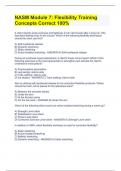
NASM Module 7: Flexibility Training Concepts Correct 100
A client reports acute soreness and tightness in her calf muscle after a long run. She describes feeling knots in the muscle. Which of the following flexibility techniques should the client use first? A) Self-myofascial release B) Dynamic stretching C) Static stretching D) Active-isolated stretching - ANSWER A) Self-myofascial release During an overhead squat assessment, a client's knees move inward. Which of the following exercises is the most appropriate to strengthen and activate th...
- Package deal
- Exam (elaborations)
- • 2 pages •
A client reports acute soreness and tightness in her calf muscle after a long run. She describes feeling knots in the muscle. Which of the following flexibility techniques should the client use first? A) Self-myofascial release B) Dynamic stretching C) Static stretching D) Active-isolated stretching - ANSWER A) Self-myofascial release During an overhead squat assessment, a client's knees move inward. Which of the following exercises is the most appropriate to strengthen and activate th...

NASM CPT - Chapter 7 (Flexibility) Correct 100%
Flexibility - ANSWER __________ is the ability to move a joint through its complete range of motion. The normal extensibility of all soft tissues that allow full range of motion (ROM). Extensibility - ANSWER _________ is the capability to be elongated or stretched. Dynamic Range of Motion - ANSWER _________ is the combination of flexibility and the nervous system's ability to control this range of motion efficiently. Benefits of flexibility training - ANSWER - Improve range of motion ...
- Package deal
- Exam (elaborations)
- • 5 pages •
Flexibility - ANSWER __________ is the ability to move a joint through its complete range of motion. The normal extensibility of all soft tissues that allow full range of motion (ROM). Extensibility - ANSWER _________ is the capability to be elongated or stretched. Dynamic Range of Motion - ANSWER _________ is the combination of flexibility and the nervous system's ability to control this range of motion efficiently. Benefits of flexibility training - ANSWER - Improve range of motion ...
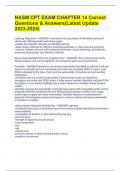
NASM CPT EXAM CHAPTER 14 Correct Questions & Answers(Latest Update 2023-2024)
Learning Objectives - ANSWER -summarize the importance of flexibility training for clients with differing health and fitness goals -explain the scientific rationale for flexibility training -apply proper methods for effective stretching exercises in client exercise programs -execute, instruct, and cue self-myofascial technique, active stretching, and dynamic exercises using proper and effective methods Where does flexibility fall in the programming? - ANSWER -this is the first part of the ...
- Exam (elaborations)
- • 10 pages •
Learning Objectives - ANSWER -summarize the importance of flexibility training for clients with differing health and fitness goals -explain the scientific rationale for flexibility training -apply proper methods for effective stretching exercises in client exercise programs -execute, instruct, and cue self-myofascial technique, active stretching, and dynamic exercises using proper and effective methods Where does flexibility fall in the programming? - ANSWER -this is the first part of the ...
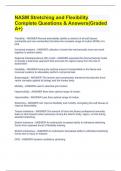
NASM Stretching and Flexibility Complete Questions & Answers(Graded A+)
Flexibility - ANSWER Normal extensibility (ability to stretch) of all soft tissues (contractile and non-contractile) that allow the complete range of motion (ROM) of a joint. functional anatomy - ANSWER collection of parts that mechanically move and work together to perform tasks. Regional Interdependence (RI) model - ANSWER expanded the biomechanical model to include a total-body approach that accounts for regions away from the site of dysfunction. Flexibility - ANSWER having the optim...
- Package deal
- Exam (elaborations)
- • 2 pages •
Flexibility - ANSWER Normal extensibility (ability to stretch) of all soft tissues (contractile and non-contractile) that allow the complete range of motion (ROM) of a joint. functional anatomy - ANSWER collection of parts that mechanically move and work together to perform tasks. Regional Interdependence (RI) model - ANSWER expanded the biomechanical model to include a total-body approach that accounts for regions away from the site of dysfunction. Flexibility - ANSWER having the optim...
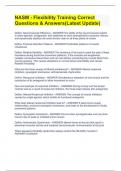
NASM - Flexibility Training Correct Questions & Answers(Latest Update)
Define: Neuromuscular Efficiency - ANSWER The ability of the neuromuscular system to allow agonists, antagonists, and stabilizers to work synergisticilly to produce, reduce, and dynamically stabilize the entire kinetic chain in all three plains of motion Define: Postural Distortion Patterns - ANSWER Predictable patterns of muscle imbalances Define: Relative flexibility - ANSWER The tendancy of the body to seek the path of least resistance during functional movement patterns ( if the muscle...
- Package deal
- Exam (elaborations)
- • 4 pages •
Define: Neuromuscular Efficiency - ANSWER The ability of the neuromuscular system to allow agonists, antagonists, and stabilizers to work synergisticilly to produce, reduce, and dynamically stabilize the entire kinetic chain in all three plains of motion Define: Postural Distortion Patterns - ANSWER Predictable patterns of muscle imbalances Define: Relative flexibility - ANSWER The tendancy of the body to seek the path of least resistance during functional movement patterns ( if the muscle...
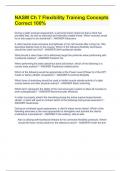
NASM Ch 7 Flexibility Training Concepts Correct 100%
During a static postural assessment, a personal trainer observes that a client has pronated feet, as well as adducted and internally rotated knees. Which muscles would he or she expect to be shortened? - ANSWER Adductors A client reports acute soreness and tightness in her calf muscle after a long run. She describes feeling knots in the muscle. Which of the following flexibility techniques should the client use first? - ANSWER Self-myofascial release What should a client foam roll to effec...
- Package deal
- Exam (elaborations)
- • 1 pages •
During a static postural assessment, a personal trainer observes that a client has pronated feet, as well as adducted and internally rotated knees. Which muscles would he or she expect to be shortened? - ANSWER Adductors A client reports acute soreness and tightness in her calf muscle after a long run. She describes feeling knots in the muscle. Which of the following flexibility techniques should the client use first? - ANSWER Self-myofascial release What should a client foam roll to effec...
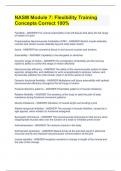
NASM Module 7: Flexibility Training Concepts Correct 100%
Flexibility - ANSWER The normal extensibility of all soft tissues that allow the full range of motion of a joint Proprioceptive Neuromuscular Facilitation (PNF) - ANSWER Stretch muscle statically, contract and stretch muscle statically beyond initial static stretch fascia - ANSWER the connective tissue in and around muscles and tendons Extensibility - ANSWER Capability to be elongated or stretched Dynamic range of motion - ANSWER The combination of flexibility and the nervous system...
- Package deal
- Exam (elaborations)
- • 8 pages •
Flexibility - ANSWER The normal extensibility of all soft tissues that allow the full range of motion of a joint Proprioceptive Neuromuscular Facilitation (PNF) - ANSWER Stretch muscle statically, contract and stretch muscle statically beyond initial static stretch fascia - ANSWER the connective tissue in and around muscles and tendons Extensibility - ANSWER Capability to be elongated or stretched Dynamic range of motion - ANSWER The combination of flexibility and the nervous system...
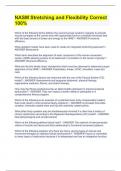
NASM Stretching and Flexibility Correct 100%
Which of the following terms defines the neuromuscular system's capacity to activate muscle synergies at the correct time with appropriate force to complete functional task with the least amount of stress and energy to the HMS? - ANSWER Functional efficiency
- Package deal
- Exam (elaborations)
- • 2 pages •
Which of the following terms defines the neuromuscular system's capacity to activate muscle synergies at the correct time with appropriate force to complete functional task with the least amount of stress and energy to the HMS? - ANSWER Functional efficiency
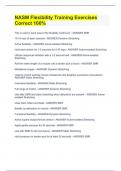
NASM Flexibility Training Exercises Correct 100%
This is used in each area of the flexibility continuum - ANSWER SMR 10-15 reps of each exercise - ANSWER Dynamic Stretching Active flexibility - ANSWER Active-isolated Stretching Hold each stretch for 1-2 seconds for 5-10 reps - ANSWER Active-isolated Stretching Utilizes reciprocal inhibition with a 1-2 second hold - ANSWER Active-isolated Stretching Roll the entire length of a muscle until a tender spot is found - ANSWER SMR Multiplanar lunges - ANSWER Dynamic Stretching Us...
- Package deal
- Exam (elaborations)
- • 2 pages •
This is used in each area of the flexibility continuum - ANSWER SMR 10-15 reps of each exercise - ANSWER Dynamic Stretching Active flexibility - ANSWER Active-isolated Stretching Hold each stretch for 1-2 seconds for 5-10 reps - ANSWER Active-isolated Stretching Utilizes reciprocal inhibition with a 1-2 second hold - ANSWER Active-isolated Stretching Roll the entire length of a muscle until a tender spot is found - ANSWER SMR Multiplanar lunges - ANSWER Dynamic Stretching Us...
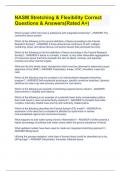
NASM Stretching & Flexibility Correct Questions & Answers(Rated A+)
NASM Stretching & Flexibility Correct Questions & Answers(Rated A+)
- Package deal
- Exam (elaborations)
- • 4 pages •
NASM Stretching & Flexibility Correct Questions & Answers(Rated A+)

Property and Casualty Insurance EXAM Questions & Answers